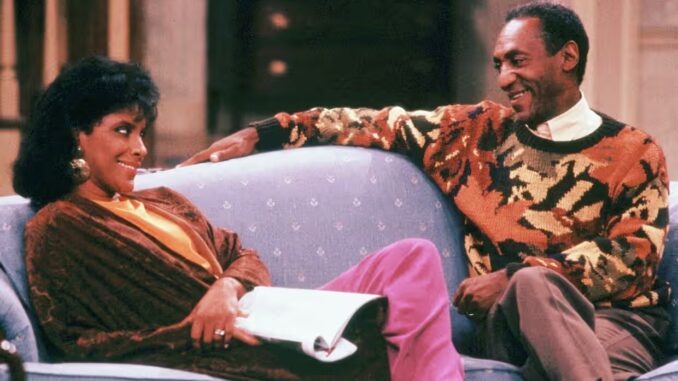
A new docuseries on the allegations against Bill Cosby reminds us of the impact his sitcom had and how watching it will never be the same again.
The Cosby Show was more than just a hit sitcom. It was a sitcom for the whole family, achingly so. Cliff Huxtable wasn’t just a put-upon father of five or a deadpan granddad or an exasperated guardian. He was a sought-after obstetrician who brought even more kids into the show’s fictional world. The scenes of him in his office, consulting with expectant families, allaying the anxieties of pregnant moms, make an important point: for all of Dr Huxtable’s hopelessness at home, he was actually really good at his job, grounding his character while making the adults in the audience feel seen, too.
We Need to Talk About Cosby, the buzzy Showtime documentary series that debuted at the end of January, ahead of Black History Month, views these scenes more skeptically, through the eyes of actor and artist Lili Bernard. In one Cosby Show episode she plays an expectant mother in an office consultation with the good doctor. On its face her scene seems sweet, perfectly innocent. But Bernard describes her on-set experience as emotionally distressful, painting Cosby as a tyrant who bullied her into delivering her lines just so. Her story speaks to a familiar on-set imbalance, the big shot who clashes with the small fry. But the more chilling reveal is that America’s Dad also allegedly drugged and raped her at the Trump Taj Mahal casino in Atlantic City, in 1990, according to her 2021 lawsuit.
Herein lies the difficulty of cancelling Cosby for those of us who still consider his work to be worthwhile. It’s one thing to cancel his live performances and pending TV projects; those directly enrich him. It’s another to stop listening to his albums –especially the early stuff, where Cosby shows an R Kelly-like tendency to tell on himself in his Spanish Fly material. But before more than 60 women accused Cosby of sexual assault, The Cosby Show was a television institution in the prime of its I Love Lucy syndication phase. Which is to say you couldn’t channel surf without landing on the episode where Theo pierces his ear or Rudy gets sick or Cliff gives birth to a hero sandwich. Netflix’s acquisition of the series in the late-aughts was not only the start of a strategy of gaining subscribers by gobbling up classic TV, but also echoed the show’s transformational impact in the 80s.
In my interview with We Need to Talk About Cosby’s director, W Kamau Bell, he concedes that part of the show’s genius was offering up five different Huxtable children for the kids at home to connect with. Rudy, the baby daughter in the Huxtable brood, was the character who hooked me, who had me setting alarms for 7pm on Thursday nights. And for as inspirational as the show’s seamless fusion of jazz and Black art and Black love and Black prosperity were, my main takeaway was Dr. Huxtable got to work from home. That was #goals.
Later years brought an appreciation for The Cosby Show as team effort, the product of years of collaboration between actors and writers and costumers and the like. Those syndication deals were great for Cosby, sure. But they also sustained workers who might’ve had difficulty moving on after the show, especially the Black collaborators. But as the allegations against Cosby snowballed, it was only a matter of time before the show was ripped from the air and from streaming, never to be easily conjured again and affecting more than just the guy whose name was in the title. When Geoffrey Owens, the actor who played Huxtable son-in-law Elvin, was outed as a Trader Joe’s employee in 2018, it spoke to the profundity of a Cosby problem that appears to have no bottom.
We Need to Talk About Cosby visits with Cosby Show contributors across the call sheet, from the overworked writers who were too removed to notice anything fishy to the stage manager who negotiated the line of models outside Cosby’s dressing room. While the docuseries steers clear of rendering judgment on folks who were just trying to keep their jobs, it does look harshly on Cliff Huxtable’s character wrinkles that once seemed innocuous – his aphrodisiac barbecue sauce, his job as a doctor who saw women in his basement office. It assumes a room full of writers didn’t have a hand in developing those ideas, or that New York isn’t littered with brownstone doctors offices. Besides, all TV shows turn cringey as our sensibilities evolve. A faithful reboot of the Honeymooners, with Ralph Kramden constantly threatening his wife with physical abuse, would never fly today.
The Cosby Show is so much more complicated. In the same way you can draw a line from Will and Grace to the legalization of gay marriage, you can trace a path from the Huxtable brownstone to the Obama White House; you’d be well challenged to tell the history of Black progress in America and on television without a glancing mention of the Huxtables. You could say The Cosby Show is the product of the man’s better angels. But it also ruined the careers and lives of some of the women who did and didn’t appear on the show. It’s a sad story, no doubt, but not unique to Hollywood productions. The key difference here is we know the score. And now that The Cosby Show is dead and buried along with America’s Dad, the kid in me can’t help but wonder if we will ever truly reckon with all that was lost.